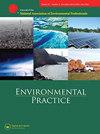Letter from the Editorial Office
Q3 Social Sciences
引用次数: 0
Abstract
This issue of Environmental Practice is devoted to water resources. Water issues, including water quality and supply, are projected to be the global geopolitical hot button issues of the twenty-first century. While much media attention has been paid to water shortages in states like California and Arizona, the Great Lakes, representing 20% of the world’s fresh water supply, are also under threat. Peter Annin’s 2006 book, The Great Lakes Water Wars, provides a cogent discussion of how competition for Great Lakes water resources is likely to play out. He notes that at the time of the writing of the book, water quality and invasive species including the zebra mussel had been the chief concern in the Great Lakes. Invasive species is still of great concern, as witnessed by the attempts to prevent invasive Asian carp from entering Lake Michigan via the Chicago Area Waterway System (CAWS). However, attention has shifted from invasive species to the issue of water supply and quality. Annin states: “Water scarcity throughout the world—and even in parts of the Great Lakes region—will put mounting pressure on one of the most abundant freshwater ecosystems on earth.... The lakes are the region’s most important and precious natural resource—they define the area’s economy, culture and environment.” The debate and tension among waterparched states over access to Great Lakes water resources will no doubt provide some great political theater in the coming decades and could ultimately lead to major changes in water resource policy at the local, state, and federal levels. Stay tuned! Water resources and Great Lakes issues will be two of many exciting tracks at the 2016 NAEP annual conference, April 11-14 in Chicago. We hope you will be able to attend.编辑部来信
本文章由计算机程序翻译,如有差异,请以英文原文为准。
求助全文
约1分钟内获得全文
求助全文
来源期刊

Environmental Practice
ENVIRONMENTAL SCIENCES-
CiteScore
0.90
自引率
0.00%
发文量
0
期刊介绍:
Environmental Practice provides a multidisciplinary forum for authoritative discussion and analysis of issues of wide interest to the international community of environmental professionals, with the intent of developing innovative solutions to environmental problems for public policy implementation, professional practice, or both. Peer-reviewed original research papers, environmental reviews, and commentaries, along with news articles, book reviews, and points of view, link findings in science and technology with issues of public policy, health, environmental quality, law, political economy, management, and the appropriate standards for expertise. Published for the National Association of Environmental Professionals
 求助内容:
求助内容: 应助结果提醒方式:
应助结果提醒方式:


